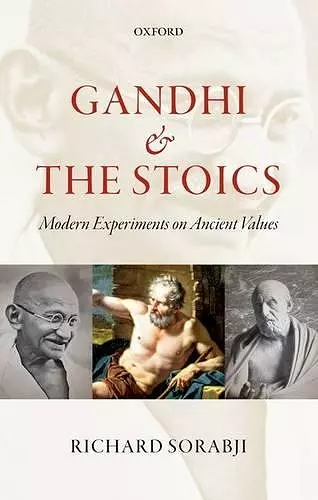Gandhi and the Stoics
Modern Experiments on Ancient Values
Format:Paperback
Publisher:Oxford University Press
Published:8th Dec '16
Currently unavailable, and unfortunately no date known when it will be back

Richard Sorabji presents a fascinating study of Gandhi's philosophy in comparison with Christian and Stoic thought. Sorabji shows that Gandhi was a true philosopher. He not only aimed to give a consistent self-critical rationale for his views, but also thought himself obliged to live by what he taught--something that he had in common with the ancient Greek and Christian ethical traditions. Understanding his philosophy helps with re-assessing the consistency of his positions and life. Gandhi was less influenced by the Stoics than by Socrates, Christ, Christian writers, and Indian thought. But whereas he re-interpreted those, he discovered the congeniality of the Stoics too late to re-process them. They could supply even more of the consistency he sought. He could show them the effect of putting their unrealised ideals into actual practice. They from the Cynics, he from the Bhagavadgita, learnt the indifference of most objectives. But both had to square that with their love for all humans and their political engagement. Indifference was to both a source of freedom. Gandhi was converted to non-violence by Tolstoy's picture of Christ. But he addressed the sacrifice it called for, and called even protective killing violent. He was nonetheless not a pacifist, because he recognized the double-bind of rival duties, and the different duties of different individuals, which was a Stoic theme. For both Gandhi and the Stoics it accompanied doubts about universal rules. Sorabji's expert understanding of these ethical traditions allows him to offer illuminating new perspectives on a key intellectual figure of the modern world, and to show the continuing resonance of ancient philosophical ideas.
Richard Sorabji offers us a way to think about Gandhi's nonviolence in a philosophically complex way that also places the Mahatma in a much broader historical canvas, one that includes not only Stocisim and ancient philosophy in general, but also early Christianity and its 'recovery' by the Mahatma's correspondent, Tolstoy. The dialogue that Gandhi and the Stoics creates between these great and otherwise disconnected movements provides an immense pleasure to the reader. Suddenly we are able to exit the narrow compass of Indian nationalism, within which Gandhi tends to be squeezed by academics, and consider his career from a number of fresh perspectives. * Faisal Devji, St. Antony's College, University of Oxford *
By looking at Gandhi from an unusual comparative perspective, Sorabji skillfully highlights several unexplored aspects and perplexities of Gandhi's moral thought. His book makes a truly original contribution to the growing philosophical literature on Gandhi. * Bhikhu Parekh, University of Westminster *
ISBN: 9780198708667
Dimensions: 217mm x 142mm x 13mm
Weight: 292g
240 pages